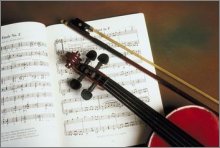How Classical Music Can Reduce Crime, Benefit Your Mood and Increase Your Spending
by www.SixWise.com
To classical music enthusiasts, the genre needs no help in
extolling its virtues, but researchers have come across some
rather surprising benefits of classical music anyway. Among
them is the finding that classical music has a penchant for
deterring crime.
|

Armed with only a CD player and speakers, police units
in the United States and the UK are fighting crime with
classical music.
|
Robberies Cut by 33 Percent
In 2004 in London, England, the British Transport Police
piped classical music into London Underground stations in
some of the area's most dangerous neighborhoods. After playing
the music for six months:
-
Robberies were cut by 33 percent
-
Staff assaults decreased by 25 percent
-
Vandalism went down 37 percent
This is not the first time that classical music has been
used to deter crime. In 2001, police in West Palm Beach, Florida
installed a CD player and speakers on an abandoned building
in a crime-ridden neighborhood. After playing classical music
-- mostly Mozart, Bach and Beethoven -- 24 hours a day for
about three months, shootings, thefts, loiterers and drug
deals decreased.
Classical Music Makes Troublemakers Disperse
A supermarket chain in the UK has also used classical music
to stop gangs of youth from congregating outside their stores.
"It is mostly easy listening music that we are playing
such as Bach, Tchaikovsky, Vivaldi and Mozart. It is a novel
concept, but it does work and does move people on," said
regional loss prevention manager Steve Hogarth.
After playing the classical music at the front of the store,
reports of troublemakers and graffiti were dramatically reduced.
"The fact that youths hang outside the store is not
a crime in itself, but the perception among staff and customers
is that it is intimidating. It seems to make it a 'less cool'
place to hang out if there is classical music playing,"
said Hogarth.
Benefits for the Mind and Body
Hospitals are also exploring the use of classical music for
patients, surgeons and visitors.
"Waiting rooms get one sound, a chapel gets music that's
very beautiful and reflective with a spiritual context, such
as instrumental pieces from a Bach cantata. In the maternity
ward, tempos will be a bit faster, and we'll create a gentle
atmosphere with cute instruments like the oboe and the harp,
and include lots of lullabies. There's documentation that
the effects of classical music on mind and body are remarkable,"
says Marc Rynearson, a classical programmer at DMX Music.
Soothing music like classical, for instance, is known to
reduce stress and anxiety. One hospital study even found that
heart patients received the same anti-anxiety benefits from
listening to 30 minutes of classical music as they did from
taking the drug Valium.
Some surgeons also report that classical music makes for
a relaxed, efficient operating room.
|

Marketing experts have figured out a sneaky tool to
get you to linger in a store and lose some of your ability
to critically analyze your decision to make a purchase:
classical music.
|
"I find classical music makes for a great environment
in the OR," says Dr. Sidney Stapleton. "Often, when
the music's playing, there's less chatter, and everyone's
more efficient, you can concentrate when you need to, and
the time passes quickly."
Classical Music Increases Spending
If you walk into a store that's playing classical music,
be careful: the music is likely being played on purpose, as
a tool to get you to buy more, as consumer advocate and columnist
Brian Vaszily entertainingly explains in How Stores are Secretly
Using Barry Manilow to Rob You.
"Music can help shape customers' time perception, lower
sales resistance and increase willingness to spend,"
says James Kellaris, a marketing professor at the University
of Cincinnati.
The complexity of classical music can actually make your
brain work harder, causing it to overcompensate and make you
feel like you've been in the store for less time than you
actually have. Meanwhile, the music can make it more difficult
for shoppers to use critical thinking in deciding whether
to buy a product. The end result is spending more time in
the store, buying more, and spending more money.
If you're interested in checking out how classical music
will affect your own mood while at home or in the car, check
out three of our favorites:
Recommended Reading
New
Study Confirms It: Music is a Must for Your Good Health ...
and Your Brain
How
Singing Improves Your Health (Even if Other People Shouldn't
Hear You Singing)
Sources
Hartlepool
Today September 20, 2006
USA
Today: Classical Music on West Palm Corner Deters Crime
Chicago
Tribune September 6, 2006